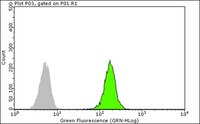05-1511 Sigma-AldrichAnti-Y14 Antibody, clone 4C4
Anti-Y14 Antibody, clone 4C4 is a Mouse Monoclonal Antibody for detection of Y14 also known as Binder of OVCA1-1, RNA binding motif protein 8A, Ribonucleoprotein RBM8A & has been validated in WB, ICC & IP.
More>> Anti-Y14 Antibody, clone 4C4 is a Mouse Monoclonal Antibody for detection of Y14 also known as Binder of OVCA1-1, RNA binding motif protein 8A, Ribonucleoprotein RBM8A & has been validated in WB, ICC & IP. Less<<Prodotti consigliati
Panoramica
| Replacement Information |
|---|
Tabella delle specifiche principali
| Species Reactivity | Key Applications | Host | Format | Antibody Type |
|---|---|---|---|---|
| H, R, M | WB, ICC, IP | M | Purified | Monoclonal Antibody |
| References |
|---|
| Product Information | |
|---|---|
| Format | Purified |
| Control |
|
| Presentation | Purified mouse monoclonal IgG2bκ in buffer containing 0.1 M Tris-Glycine (pH 7.4, 150 mM NaCl) with 0.05% sodium azide. |
| Quality Level | MQ100 |
| Physicochemical Information |
|---|
| Dimensions |
|---|
| Materials Information |
|---|
| Toxicological Information |
|---|
| Safety Information according to GHS |
|---|
| Safety Information |
|---|
| Storage and Shipping Information | |
|---|---|
| Storage Conditions | Stable for 1 year at 2-8°C from date of receipt. |
| Packaging Information | |
|---|---|
| Material Size | 100 µg |
| Transport Information |
|---|
| Supplemental Information |
|---|
| Specifications |
|---|
| Global Trade Item Number | |
|---|---|
| Numero di catalogo | GTIN |
| 05-1511 | 04053252740183 |
Documentation
Anti-Y14 Antibody, clone 4C4 MSDS
| Titolo |
|---|
Anti-Y14 Antibody, clone 4C4 Certificati d'Analisi
| Titolo | Numero di lotto |
|---|---|
| Anti-Y14, clone 4C4 - 1959697 | 1959697 |
| Anti-Y14, clone 4C4 - 2318037 | 2318037 |
| Anti-Y14, clone 4C4 - 3291831 | 3291831 |
| Anti-Y14, clone 4C4 - 3786610 | 3786610 |
| Anti-Y14, clone 4C4 - 3982605 | 3982605 |
| Anti-Y14, clone 4C4 - 4183238 | 4183238 |
| Anti-Y14, clone 4C4 - NRG1657998 | NRG1657998 |
| Anti-Y14, clone 4C4 -2765917 | 2765917 |
| Anti-Y14, clone 4C4 Monoclonal Antibody | 3145031 |
| Anti-Y14, clone 4C4 Monoclonal Antibody | 3058488 |















